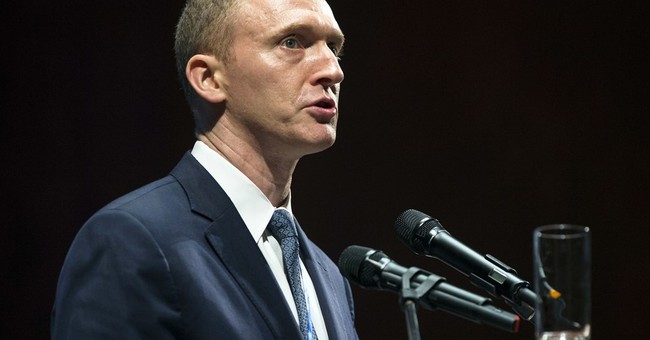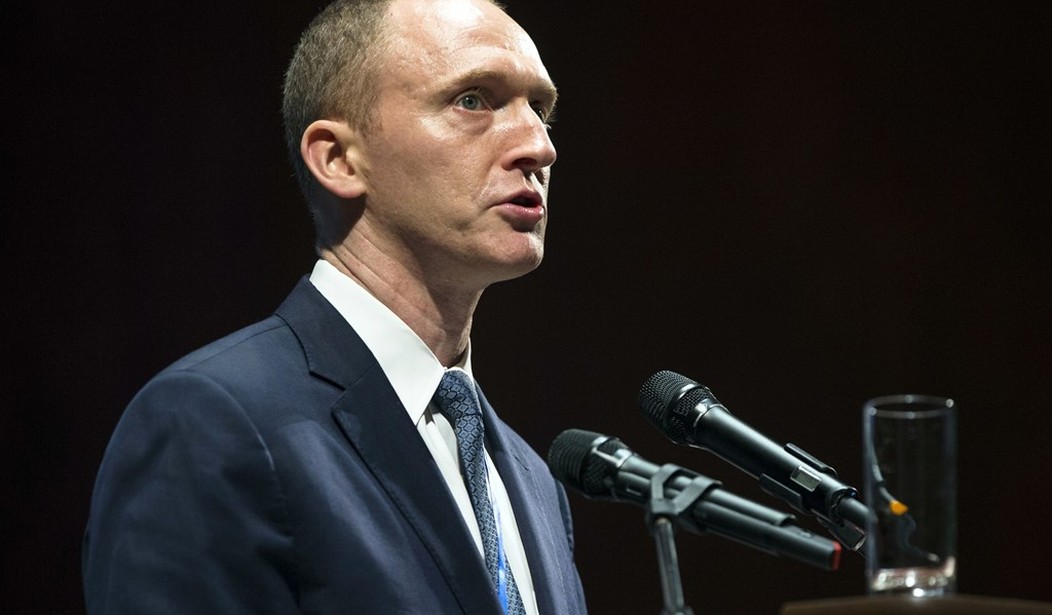
FILE – In this Friday, July 8, 2016, file photo, Carter Page, then adviser to U.S. Republican presidential candidate Donald Trump, speaks at the graduation ceremony for the New Economic School in Moscow, Russia. Page, once a little-known investment banker-turned-adviser in the outer circle of the improbable Trump campaign, is emerging as a central figure in the controversy surrounding campaign connections to Russia. (AP Photo/Pavel Golovkin, File)
From former FBI Director James Comey and his successor, Christopher Wray, to former Deputy Attorney General Rod Rosenstein, high-ranking Obama Administration officials have maintained that none of the “errors” they made in their applications to the FISA Court for the warrant to spy on Carter Page were intentional. Although it’s obvious to all that these machinations were planned and executed inside of the top echelons of the FBI and the DOJ, law enforcement officials have tried to attribute these “mistakes” to lower-level agents and attorneys. They’ve repeatedly claimed they were accidental “process errors downstream from them and not an effort to deceive the judges.”
They continued to make excuses after Intelligence Community Inspector General Michael Horowitz released his December 9 report, which found that the four FISA Court warrant applications “were riddled with mistakes, including 17 examples of misconduct, misinformation or outright lies.”
Leave it to the brilliant and relentless investigative reporter John Solomon to find the gem inside of the nineteen-page Order issued last week by U.S. District Court Judge James A. Boasberg, the new chief judge of the Foreign Intelligence Surveillance Court. Boasberg, Solomon writes, “took direct aim at the excuses and blame-shifting of these senior Obama administration FBI and DOJ officials.”
Solomon reports that “in just 21 words, Boasberg provided the first judicial declaration the FBI had misled the court, not just committed process errors.” Boasberg wrote:
There is thus little doubt that the government breached its duty of candor to the Court with respect to those applications.
Simply put, none of this was an accident. It was deliberate. Boasberg adds:
The frequency and seriousness of these errors in a case that, given its sensitive nature, had an unusually high level of review at both DOJ and the Federal Bureau of Investigation have called into question the reliability of the information proffered in other FBI applications.
Solomon explains the enormity of Boasberg’s statement:
Boasberg’s ruling was far more than a temporary suspension of FBI personnel’s participation in the FISA court. It is the first and only judicial finding in the Russia case that the FBI vastly misled the nation’s intelligence court and that blame must be shouldered by federal law enforcement’s top leaders, many of whom have spent much of the last three years trying to escape such accountability.
For those who have begged the FISA court for years to more aggressively rebuke the conduct in the Russia case, Boasberg’s ruling was a welcome step in the right direction and a first effort to end the excuse-making. But those critics are holding out for more, including prosecutions or disciplinary action.
In the meantime, those who led the FBI and DOJ through that turbulent time — Comey and his deputy Andrew McCabe, as well as former acting Attorney General Sally Yates and Rosenstein — must come to grips with this new reality. A judge has formally concluded that his court was misled by the work product they oversaw and signed.
Boasberg’s ruling was issued one week ago and was widely reported by the media. However, the coverage focused only upon Boasberg’s order “suspending all FBI and DOJ lawyers involved in the Russia collusion case from appearing before his court until it is determined whether they engaged in misconduct.”
But of more importance, according to Solomon, was “his language pinning responsibility for FISA abuses squarely on senior officials, not just lower-level line agents and lawyers who prepared the warrant applications. In other words, he is worried the bad conduct exhibited by the FBI may extend to more cases affecting others’ civil liberties.”
Boasberg is saying that Director Wray’s proposed changes are fine, but they aren’t enough. He wrote that “the errors the OIG pointed out cannot be solved through procedures alone. DOJ and the FBI, including all personnel involved in the FISA process, must fully understand and embrace the heightened duties of probity and transparency that apply in ex parte proceedings.”
This was a remarkable statement by a left-leaning judge. It marks the first time a non-conservative admits that these officials meant to deceive the FISA Court.
Is it too much to hope that these officials will one day be held accountable for their abuse of power and their corruption?
Let’s hear more of this, please. John Durham, are you listening?













Join the conversation as a VIP Member